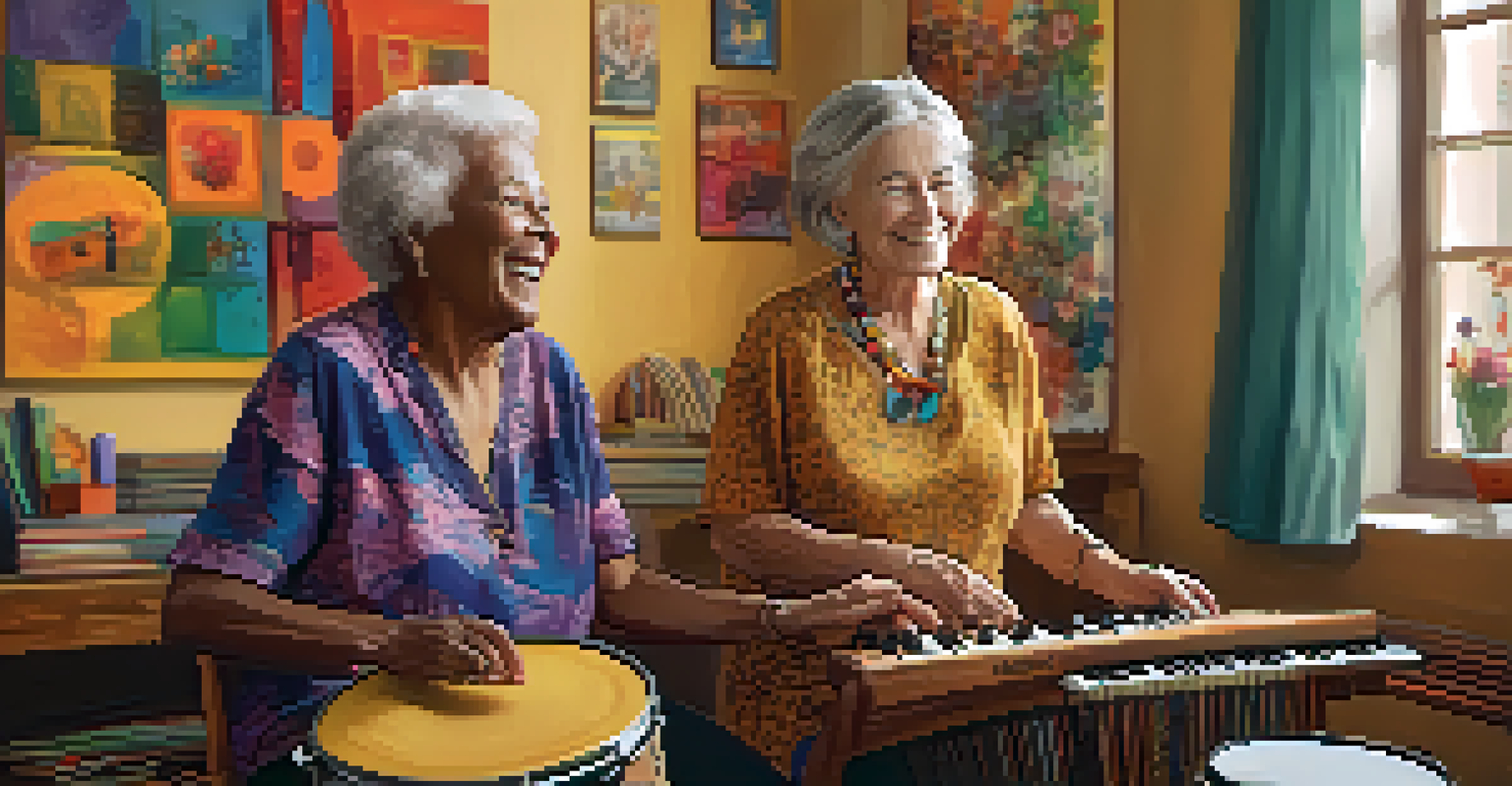The Science Behind Music's Effect on Aging Brains

Music's Role in Brain Development and Aging
From the moment we enter the world, music is intertwined with our experiences. It plays a crucial role in brain development, stimulating connections between neurons. As we age, these neural pathways can often diminish, but engaging with music can help maintain and even enhance cognitive functions.
Music can change the world because it can change people.
Research shows that listening to or playing music activates various regions of the brain, including those responsible for memory, emotion, and even motor skills. This activation is essential, as it keeps the brain engaged and can counteract some cognitive decline associated with aging. In a way, music acts as a workout for the brain, keeping it sharp and agile.
Moreover, music therapy has emerged as a powerful tool for seniors, aiding in everything from memory recall to emotional well-being. Just like a good book or a heartwarming movie, music can evoke emotions and memories, creating a rich tapestry of experiences that stimulate the aging brain.
The Neuroscience of Music Processing
At its core, music processing involves complex neurobiological mechanisms. When we listen to music, multiple areas of the brain collaborate, including the auditory cortex, hippocampus, and even the prefrontal cortex, which is responsible for decision-making. This collaboration promotes neural plasticity, the brain's ability to adapt and reorganize itself.

Interestingly, studies have shown that individuals with Alzheimer's disease or other forms of dementia respond positively to music they enjoyed in their youth. This phenomenon suggests that music can tap into long-term memory, providing a connection to the past that other stimuli may not evoke. It's like a time capsule, unlocking cherished memories and emotions.
Music Enhances Brain Health
Engaging with music can stimulate brain connections, helping maintain cognitive functions as we age.
Furthermore, the rhythm and melody in music can engage the brain in unique ways, enhancing mood and motivation. This engagement can lead to improved focus and attention, essential for maintaining cognitive health as we age.
Emotional Benefits of Music for Seniors
Music is not just a treat for the ears; it also serves as a powerful emotional outlet. For seniors, engaging with music can combat feelings of loneliness and depression, making it an essential aspect of mental health. Whether it’s singing along to old favorites or simply enjoying soothing melodies, music can uplift the spirit.
The music that can change the world is the music that is in the hearts of the people.
Research indicates that music can trigger the release of dopamine, a neurotransmitter associated with pleasure and reward. This boost in dopamine levels contributes to feelings of happiness and contentment, making music a natural mood enhancer. It's like having a mini celebration every time a favorite song plays.
Additionally, group music activities, such as community choirs or dance classes, foster social connections, which are vital for emotional well-being. Sharing the joy of music with others can create a sense of belonging, reducing feelings of isolation that often accompany aging.
Music Therapy: A Promising Approach
Music therapy has gained traction as an effective intervention for various age-related conditions. This therapeutic approach employs music to address physical, emotional, cognitive, and social needs. Trained music therapists use personalized playlists or live music sessions to engage seniors, tailoring experiences to individual preferences and needs.
Studies have shown that music therapy can significantly improve cognitive function and emotional well-being in seniors with dementia and Alzheimer's. Participants often display enhanced memory recall, reduced anxiety, and increased overall happiness after sessions. It's a testament to the deep-seated connection between music and the mind.
Music Therapy Supports Seniors
Music therapy effectively addresses the physical, emotional, and cognitive needs of seniors, improving their overall well-being.
Moreover, music therapy can also assist in pain management and physical rehabilitation. By focusing on the rhythm of music, patients can better engage in exercises, making recovery a more enjoyable process. In this way, music becomes a bridge between therapy and joy, helping seniors reclaim their vitality.
The Impact of Rhythm and Melody on Cognitive Skills
The elements of rhythm and melody play a pivotal role in how music influences cognitive skills. Rhythm, in particular, is closely linked to movement and coordination, which can enhance motor skills in seniors. Engaging in rhythmic activities can improve balance and coordination, essential for maintaining independence as we age.
Melody, on the other hand, has been shown to activate memory pathways in the brain. Familiar tunes can evoke specific memories or experiences, aiding in recall and recognition. This connection between melody and memory illustrates why certain songs can transport us back to significant moments in our lives.
By incorporating music into daily routines, seniors can engage both their bodies and minds. Whether it's tapping along to a beat or recalling lyrics, these activities stimulate cognitive functions and promote an active lifestyle.
Creating a Personal Soundtrack for Aging Gracefully
Crafting a personal soundtrack can be a delightful way for seniors to engage with music daily. This could involve curating playlists of favorite songs from different life stages, making it a nostalgic journey through time. Listening to these tunes can evoke joyful memories and provide comfort during challenging moments.
Participating in music-making activities, such as playing an instrument or singing, can also be an enriching experience. Not only does it foster creativity, but it also encourages social interaction and cognitive engagement. Whether joining a local band or simply strumming a guitar at home, these activities can enhance overall well-being.
Rhythm and Melody Boost Skills
The elements of rhythm and melody in music can enhance motor skills and activate memory pathways in the brain.
Ultimately, the key is to explore various musical genres and find what resonates personally. Whether it's classical, jazz, or pop, the right music can create a vibrant atmosphere that supports emotional and cognitive health.
Future Research Directions in Music and Aging
As our understanding of the relationship between music and the aging brain deepens, future research will play a critical role in uncovering new insights. Ongoing studies are exploring how different types of music and listening experiences can uniquely affect cognitive functions, memory, and emotional well-being. This research can lead to more tailored interventions for seniors.
Additionally, advancements in technology, such as virtual reality and interactive music experiences, may open new avenues for engaging seniors in music therapy. Imagine a virtual concert that not only provides entertainment but also stimulates cognitive responses and emotional connections. The possibilities are endless.

Ultimately, the goal is to harness the power of music to enhance the quality of life for seniors. By focusing on these emerging areas of research, we can develop innovative strategies that promote cognitive health and emotional resilience as we age.